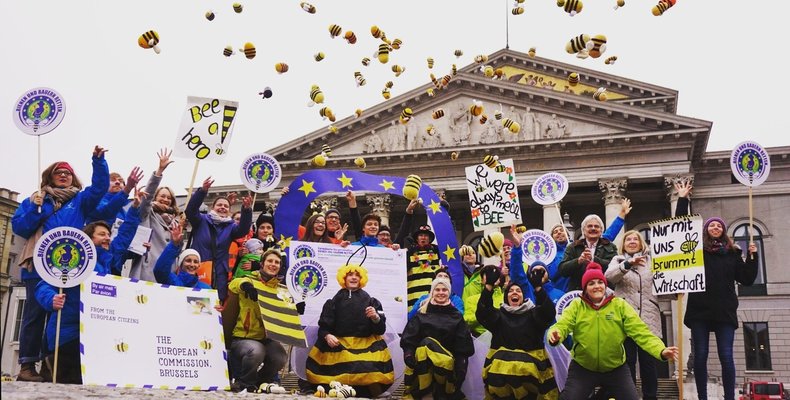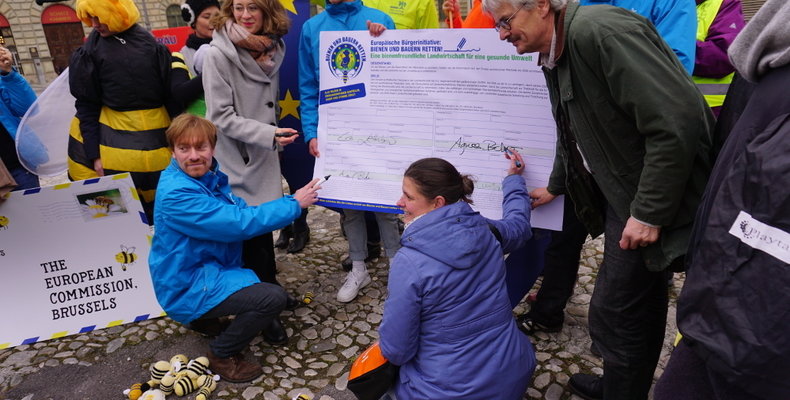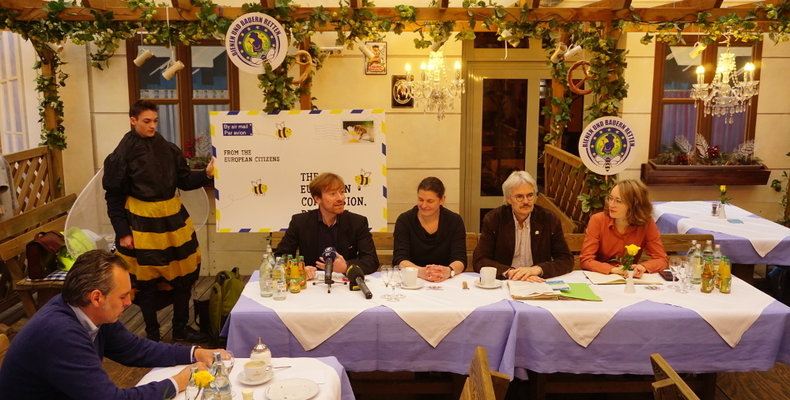Launch ECI signature collection

© Juanfe Carrasco
PRESS RELEASE
Huge Europe-wide campaign launches to ban pesticides, transform agriculture and save bees and nature
Brussels, Monday 25 November 2019 - A European Citizens’ Initiative launches today to phase out synthetic pesticides by 2035, support farmers, and save bees and nature. If it gathers one million signatures by September 2020, the EU Commission and Parliament must consider turning the campaign’s demands into law. [1]
90 organisations from 17 EU countries are jointly launching the campaign, with the support of organic farming associations.
International scientists have called for an urgent "transformative change" to stop the collapse of nature. A quarter of Europe's wild animals are severely threatened, half of our nature sites are in an unfavourable condition, and ecosystem services are deteriorating. [2]
Meanwhile, millions of farmers are being squeezed out by unfair prices, the lack of political support and big corporations. Four million small farms disappeared between 2005 and 2016 in the EU. [3]
The ECI calls on the European Commission to introduce legal proposals to:
-
Phase out synthetic pesticides by 2035: Phase out synthetic pesticides in EU agriculture by 80% by 2030, starting with the most hazardous, to become 100% free of synthetic pesticides by 2035
-
Restore biodiversity: Restore natural ecosystems in agricultural areas so that farming becomes a vector of biodiversity recovery
-
Support farmers in the transition: Reform agriculture by prioritising small scale, diverse and sustainable farming, supporting a rapid increase in agroecological and organic practice, and enabling independent farmer-based training and research into pesticide- and GMO-free farming
Helmut Burtscher, pesticides and chemicals expert from Global 2000/Friends of the Earth Austria said “Only sustainable, pesticide-free farming can secure the food supply of present and future generations and provide answers to the growing challenges posed by climate change. In addition, it contributes to the preservation of biodiversity and reduces greenhouse gas emissions. A responsible European agricultural policy must therefore promote the further development of agro-ecological methods and support farmers in their transition to pesticide-free production."
Veronika Feicht from the Munich Environmental Institute said “We are bringing the fight against synthetic pesticides to the European level by giving a united voice to the people all over Europe who are demanding a new agricultural system. Citizens want a system that no longer damages biodiversity and ecosystems or puts health stress on consumers, but instead ensures the livelihood of bees and farmers alike and is healthier for people. With our initiative, we are committed to making this kind of agriculture a reality throughout Europe."
François Veillerette, Director of Générations Futures said "We are calling on European citizens to massively support this initiative for a rapid phasing out of all synthetic pesticides in the EU. We hope millions of people will soon join our demands to ban pesticides, transform agriculture, support farmers in the transition and save biodiversity."
The campaign is run by a cross-sector alliance of civil society organisations covering the environment, health, farming and beekeeping. Amongst others, the organisers include the European networks Friends of the Earth Europe and the Pesticide Action Network (PAN) as well as the Munich Environmental Institute, the Aurelia foundation (Germany), Générations Futures (France) and GLOBAL 2000/Friends of the Earth Austria.
ENDS
NOTES
[2] https://www.ipbes.net/news/Media-Release-Global-Assessment
Bees and other pollinators in particular are indispensable for preserving our ecosystems and biodiversity. Up to one third of our food production and two thirds of our daily fruits and vegetables rely on pollination through bees and other insects. Yet, they are existentially threatened by constant pesticide-contamination and habitat loss due to industrial agriculture.
[3] The rapid decline of both small farms and wildlife is deeply rooted in our current model of agricultural food production that heavily relies on big scale monocultural farming and the use of synthetic pesticides. To make things worse, the EU actively funds this form of agriculture through its current agropolitical agenda and its system of subsidies that favours mass production over small scale and eco friendly farming. http://www.foeeurope.org/sites/default/files/publications/nyeleni_eca_-_more_farmers_better_food_25.03.2019_0.pdf (PDF document)

© Juanfe Carrasco

© Juanfe Carrasco
